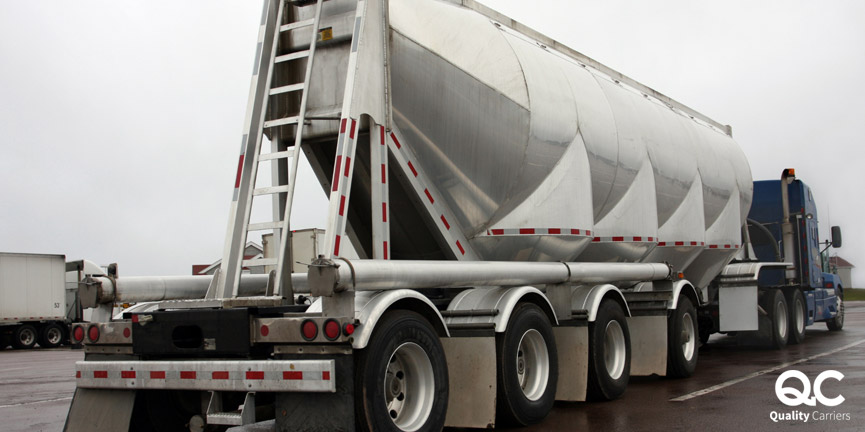Imagine hitting the road with a load of bulk goods, transporting everything from grains to minerals across the vast landscapes of our country. If the allure of transporting these essential materials while enjoying the freedom of the open road appeals to you, then the path to becoming a dry bulk driver might be your perfect route. This unique and specialized trucking niche presents challenges and rewards, making it an intriguing option for those seeking a distinctive career in the transportation industry. This guide explores your steps to become a skilled and proficient dry bulk driver.
Let’s explore the details that can shape your successful career as a dry bulk driver.
What is a dry bulk driver?
A dry bulk driver is a professional truck driver who specializes in transporting dry and granular bulk materials, often used in industries such as agriculture, construction, and manufacturing. Unlike conventional trucking, where goods are typically packaged or contained, dry bulk drivers deal with loose, free-flowing materials poured, shoveled, or scooped into their trucks’ compartments.
The nature of the cargo makes the role of a dry bulk driver distinct and challenging. These drivers operate specialized trucks known as “bulk carriers” or “bulk trailers,” designed with compartments to transport various dry materials safely. These compartments have mechanisms to control cargo flow during loading and unloading.
The responsibilities of a dry bulk driver extend beyond just driving. They are tasked with properly loading and securing the cargo, ensuring it remains stable and evenly distributed throughout the journey. Moreover, dry bulk drivers must be well-versed in handling various types of bulk materials, as each material can have different characteristics, such as density and flow behavior.

How Do I Become a Dry Bulk Driver?
Certification – Class A CDL (Commercial Driver’s License)
The first crucial step towards becoming a dry bulk driver is obtaining a Class A Commercial Driver’s License (CDL). This license is necessary for operating large commercial vehicles, including the specialized trucks used in dry bulk transportation. The process involves:
- Research: Look into the CDL requirements in your state, as they can vary. Determine the age limit, medical requirements, and any other prerequisites.
- Training: Enroll in a reputable CDL training program. These programs cover the necessary skills, knowledge, and hands-on training to operate commercial vehicles safely.
- Written Test: Prepare for and pass the written CDL exam, which evaluates your understanding of traffic laws, road signs, and other essential topics.
- Practical Test: Demonstrate your driving skills and ability to handle a commercial vehicle during the practical test. This includes tasks like parking, backing up, and maneuvering.
General Qualifications
Ensure you meet the basic qualifications expected of all truck drivers. These may include:
- Education Requirement: A high school diploma or GED is typically the minimum educational requirement for aspiring dry bulk drivers.
- Physical and Mental Fitness: Maintaining good physical and mental condition is essential for dry bulk drivers, ensuring they can handle the job demands effectively.
- Clean Record: Before entrusting anyone with the wheel of a large truck, clean drug screenings and an impeccable driving record are non-negotiable prerequisites.
- Age and Experience: Trucking regulations prohibit drivers under 21 from transporting goods across state lines. Consequently, trucking companies often seek older drivers, particularly those with relevant experience.
Dry Bulking Specifications
Dry bulking specifications encompass a comprehensive set of guidelines and requirements for successfully transporting granular bulk materials using specialized vehicles known as dry bulk carriers. These specifications are meticulously designed to ensure the safety of both the driver and the cargo while maintaining the quality and integrity of the transported materials.
Key aspects covered by dry bulking specifications include:
- The proper techniques for loading and unloading materials.
- The design and configuration of compartments within the carrier.
- Methods for securing and distributing the cargo to prevent shifting.
- Considerations for weight distribution and legal limits.
- Adherence to safety measures tailored to the specific characteristics of the transported materials.
By adhering to these specifications, dry bulk drivers ensure that their transport operations are efficient, safe, and compliant with industry regulations. This contributes to the reliable movement of essential bulk materials across various sectors.
Dry Bulk Driver Salary
The salary of a dry bulk driver can vary based on factors such as experience, location, company, and cargo type. On average, dry bulk drivers in the United States can expect to earn between $40,000 and $70,000 per year. Entry-level drivers may start at the lower end of this range and see an increase as they gain experience and expertise in handling bulk materials.
Additionally, factors like the specific type of cargo being transported, the geographic region where the driver operates, the reputation and size of the employing company, and the availability of benefits and bonuses can all impact a dry bulk driver’s salary. It’s advisable for individuals interested in this career to research and consider various factors to determine the potential salary range they can expect based on their circumstances.

Find Work as a Dry Bulk Driver
For those considering a career as a dry bulk driver, the search for the right trucking company can greatly impact the trajectory of their journey. In this pursuit, Quality Carriers emerge as a notable contender, renowned for its exceptional standards in the transportation industry.
Research reputable trucking companies that prioritize safety, reputation, and employee growth. Quality Carriers shine as a prominent option, specializing in dry bulk, chemical, and liquid transportation. This company values experienced dry bulk drivers with a deep understanding of cargo handling intricacies and safety procedures, making it an appealing choice for aspirants in this field.
Navigate job listings on the Quality Carriers website or reputable job platforms to identify available dry bulk driver positions. This offers insights into the specific requirements, responsibilities, and advantages of joining their team. Tailor your application to align with the demands of a dry bulk driver role, accentuating your relevant experience, endorsements, and any specialized training related to dry bulk transportation.
In conclusion, becoming a dry bulk driver requires specialized training, experience, endorsements, and a commitment to safety. It’s a pathway that offers unique challenges and opportunities for those drawn to the idea of transporting bulk goods while enjoying the freedom of the open road. Becoming a dry bulk driver could be a fulfilling career choice if you’re ready to take on the challenges and embrace the rewards.
FAQs
Yes, specialized training is crucial. Dry bulk drivers must understand cargo handling techniques, weight distribution, and safety protocols specific to bulk materials. Training programs often cover loading, unloading, securing cargo, and maintaining safe driving practices.
Depending on the type of cargo you’ll transport, endorsements such as Tanker and Hazardous Materials (HazMat) might be required. These endorsements demonstrate your proficiency in handling specific materials and adhering to safety regulations.
Dry bulk drivers enjoy a unique skill set and the opportunity to work in a specialized niche of the trucking industry. They often earn competitive salaries, benefit from job stability due to industry demand, and can choose from various companies specializing in bulk transportation.
Dry bulk shipping involves transporting large quantities of unpackaged dry commodities, such as minerals, grains, ores, and coal. These materials are carried in bulk without individual packaging and are crucial components in agriculture, construction, and manufacturing.
A dry bulk carrier, or a bulk carrier or bulker, is a specialized ship designed to transport dry bulk commodities. These vessels have spacious cargo holds optimized for efficiently loading, transporting, and unloading granular materials. They play a pivotal role in global trade by facilitating the movement of essential raw materials across regions.









